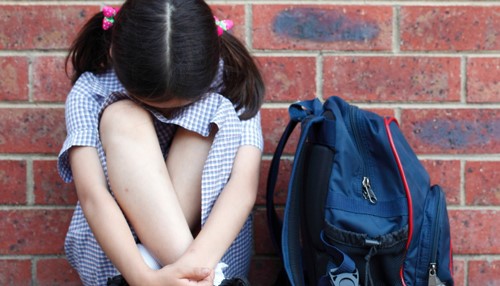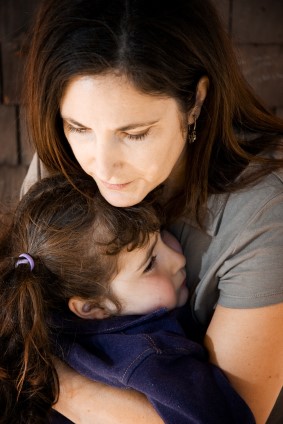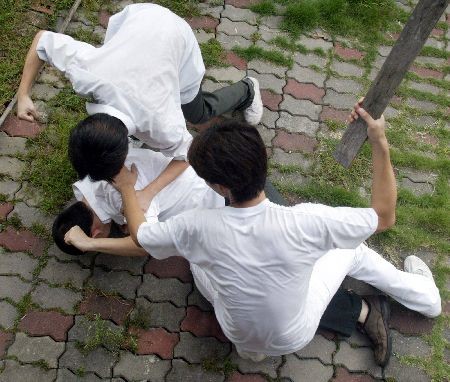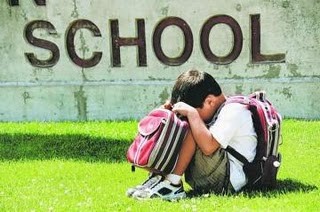School time is the best time for children. School is where the children learn the new skills and knowledge, meeting new friends, playing with peers and etc. However, there are a few children that refuse to go to the school. Plenty of reasons been given to excuse them from going to the school. The children with school refusal behavior cases are increasing and worrying day by day.
School refusal behavior, if left unaddressed, can cause serious short term problems, such as distress, academic decline, alienation from peers, family conflict and financial and legal issues. Malaysia is growing to become a high-income nation. Education becomes a major issue in producing skillful and knowledgeable workers. The children with school refusal behavior will be having problems in seeking a job later. Therefore, this behavior must be given serious look and manage properly by the parents, teachers and society.

Gambar hiasan: www.childmind.org
The possible contributing factors to the school refusal behavior are:
Separation anxiety
The children with school refusal behavior are anxiety around being separated from significant parents or carers. They believe that something bad would happen to their parents or carer when they go to school. The children will give abundance of excuses, crying, screaming and hiding from been send to the school. In some cases, the children are worrying their mother will be beaten up by the father when they go to the school.

Gambar hiasan: http://www.anxietytreatmenthub.com

Gambar hiasan: www.mpoweredparenting.com
Anxiety of self-performance and evaluation
Some of the children with school refusal behavior are having excessive anxiety about social situations or activities that involve a performance or evaluation, such as examination/test, speaking in front of the class (public speaking) and sport days. They have low self esteem and believe will be humiliated by their peers.

Gambar hiasan: www.universitas.ca
Anxiety to social community
The children with school refusal behavior are having excessive anxiety about peers’ and teachers’ acceptance of their existence. They would feel uncomfortable to communicate and socialize with their peers.

Gambar hiasan: www.emedicalguild.com

Gambar hiasan: www.redorbit.com
General anxiety
The children with school refusal behavior believe that they are exposing to the danger (such as accident, war, nature disaster), something bad would happen to them if they attend the school.
Depression
Some of the children with school refusal behavior are having depression or combination of depression and anxiety. These children might feel sad without a reason, no interest in all activities, weight loss, and difficulty to fall asleep, feeling useless, and feeling guilty. The children with intention to harm themselves or others should be referred to nearest clinic/hospital for further evaluation and treatment.

Gambar hiasan: www.wfsb.com
Bully
Some children with school refusal behavior are afraid of been bullied by their peers. There are two types of bullies that are common in school, which are physical bully and emotional bully. Physical bully might cause physical injuries to the children. Meanwhile the emotionally bully would cause depression, anxiety and may low the self esteem of the child.

Gambar hiasan: www.socialmoms.net
Medical problem
Children with school refusal behavior often use the reasons of medical problem (unfit) for not attend the school. Most common complaints are headache, stomachache, fever, nausea, and etc. Parents should bring the child to the nearest clinic/hospital for further check up to verify their complaint.

Gambar hiasan: http://world.edu/stay-home-coping-school-refusal/

Gambar hiasan: www.docgautham.com
Signs of school refusal
- Frequent complaints from the school about the absences
- The child frequently absence without reasonable excuses
- The child on absence on certain day such as examination/test day, public speaking and sport day
- The child often request to go home earlier than normal school period
- The child is anxiety about the parents’ safety at home
- Tearfulness before school or repeated pleas to stay at home
Adapted from American Occupational Therapy Association (2009), roles of Occupational Therapist in Pediatric Rehabilitation are as below:
- Assessment through observation, interview (the child, parents, carers, teachers)
- Plan and provide intervention for the child
- Identify and minimize the factors that lead to the school refusal behavior
- Conduct school visit, discuss with the teachers about appropriate modification required to enable conducive learning environment for the child
If your child having one of the signs above, kindly bring your child to the nearest clinic/hospital for further screening and check up.
References:
- School Refusal: Information for Educator (2013). Retrieved on 1 April 2014 from nasponline.org/families/schoolrefusal.pdf
- When Kids refuse to go to School (2012). Retrieved on 21 April 2014 from http://www.childmind.org/en/posts/articles/2012-10-2-what-is-school-refusal
- Anxiety and School Refusal (2012). Retrieved on 22 April 2014 from http://www.med.monash.edu.au/spppm/research/devpsych/download/rdudley.pdf
| Last Reviewed | : | 31 May 2018 |
| Translator | : | Noor Emellia bt. Jamaluddin |
| Accreditor | : | Rokiah bt. Alias |







